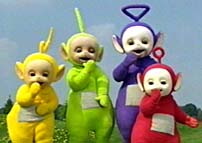 Teletubbies in Britain: craze, controversy and consumer frenzy
Teletubbies in Britain: craze, controversy and consumer frenzy
Originally published in Current, Dec. 15, 1997
By Karen Everhart Bedford
Teletubbies haven't officially landed in the U.S. public TV schedule yet, but they've already roused controversy in Britain and landed a great big licensing deal over here.
Hasbro, makers of Playskool Baby and other major toy brands, will introduce a range of Teletubbies products--soft toys, figures, games, puzzles, bath toys and other items--by next fall. "It was important to find a partner who understands that young children need to be nurtured, not exploited," said Kenn Viselman, president of the itsy bitsy Entertainment Co., which holds licensing rights to Teletubbies in the U.S. and Canada.
Teletubbies, the children's TV program that sparked both a craze and outrage in Britain with its debut on BBC2 this year, will begin airing on PBS's Ready to Learn Service in April.
If the British response to the show is any indication of what to expect from U.S. audiences, brace yourselves for a consumer grabfest of purple dinosaur proportions. This Christmas season, retailers in the U.K. are rationing Teletubby products to prevent shoppers from fighting in check-out lines.
Shortly after its debut in England last spring, the show generated an outcry of adult disbelief over claims that it helps baby viewers develop language skills and thought processes. The Teletubbies--four fuzzy "technological babies" who have TVs in their tummies and antennas on their heads--speak in gibberish and repeat themselves so much that exasperated adults are baffled.
The show is being adapted for U.S. audiences, and its promoters won't have preview tapes available until January. But British press accounts offer hints of what the series will look like.
Here's a description of a typical episode by George Street, a self-confessed Teletubbies addict and columnist for Britain's New Civil Engineer magazine: "The sun rises over Teletubbie land. A sinister loudspeaker rises from a clump of plastic flowers and announces: 'Time for Teletubbies.' Just as suspense begins to bite, our heroes--Tinky Winky, Dipsy, LaLa and Po--emerge from their house, screech, run around and fall over."
"In a masterly plot twist, one of the TVs switches on--viewers have to guess which one--and an interminably dull film of infants screeching, running around and falling over is shown. This is then repeated for viewers who are not already brain dead."
"Dynamo dialogue includes frequent repetition of the phrases 'aaahhh' and 'love you'. There is a lot of giggling and the stars dance a toe-tapping Teletubbie two-step."
The controversy spawned by Teletubbies came as no surprise to Viselman, who said he predicted a stormy reception when the show was on the drawing board at Ragdoll Productions. Children generally don't start watching TV until they're 18 months old, but Teletubbies viewers are as young as 12 months.
"There's some discussion about whether kids should be watching TV at that age," Viselman acknowledged in an interview. But since parents are using TV as a babysitter, "they might as well have good product."
The BBC officially puts the program's target audience in the 2-5 range.
Last month, at the National Educational Telecommunications Association (NETA) conference, PBS President Ervin Duggan alerted pubcasters that "a very bizarre" show is coming to the schedule. Its stars do everything over and over again, he observed. "I used to think Barney would make me throw something at the television set. Wait til you see The Teletubbies."

 To Current's home page
To Current's home page Current Briefing on children's TV programming.
Current Briefing on children's TV programming.  Later article: The producers of Teletubbies designed the show for the capabilities and needs of toddlers.
Later article: The producers of Teletubbies designed the show for the capabilities and needs of toddlers.